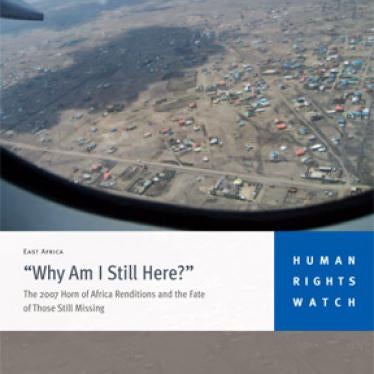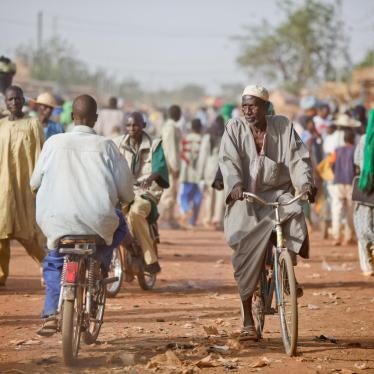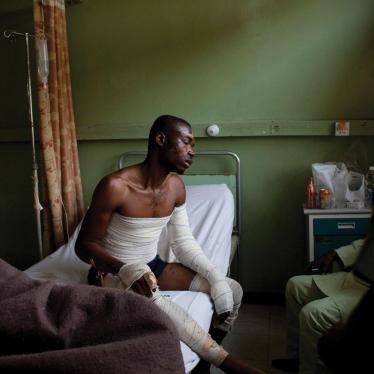During the Bush administration, a cornerstone of the so-called global war on terror was “extraordinary rendition” — the extrajudicial detention and transfer of terror suspects from one country to another.
One might think that the world had learned a lesson in how not to behave. But it is a lesson Kenya seems unwilling to learn.
Three years ago, Kenya arbitrarily arrested, held in incommunicado detention and unlawfully transferred dozens of men, women and children to Somalia after they fled the worsening conflict there.
More than 100 people, including several children under 10 years old, were moved from one Kenyan prison to another and finally flown on secret flights to Somalia, even as lawyers were trying to have them produced in Kenyan courts.
The group included at least 10 Kenyan citizens, and Raila Odinga, now Kenya’s prime minister, pledged during the 2007 presidential election campaign to investigate their deportation.
Those extraordinary renditions might well have gone unnoticed were it not for a dynamic Kenyan activist named Al-Amin Kimathi and the volunteers at the Muslim Human Rights Forum, who visited Nairobi’s jails day and night to identify the detainees, bring them food and legal support, and raise public awareness of their plight.
The publicity damaged Kenya’s international reputation and its relations with the Muslim population.
Nevertheless, Kenya has done it again.
Following the July 11 World Cup bombings in Kampala that were claimed by the Somali insurgent group al-Shabaab, Kenya arrested six men and transferred them to Uganda without arrest warrants or court orders requesting their extradition. Kimathi described the process as “kidnapping.”
Mutual statutory extradition arrangements among Kenya, Uganda and Tanzania commit each country to apprehending and handing over suspects when a court in a neighboring country has issued an arrest warrant.
The process also entails judicial hearings and the detainee’s right to habeas corpus — to be produced before the court.
But according to Mbugua Mureithi, a Kenyan lawyer who represented several of the Kenyan suspects and filed habeas corpus applications on their behalf in Kenyan courts, the Kenyan government has not referred to any warrants issued by Ugandan courts in any of those cases.
In fact, the affidavits in response to the habeas corpus applications have merely stated that Kenya is handing over the suspects to “assist Ugandan authorities with investigations of the 7/11.”
To their credit, Tanzanian authorities are allegedly refusing to transfer a suspect they are holding in connection with the Kampala bombings without proper extradition proceedings.
The Kenyan and Ugandan authorities’ disregard for the rule of law also apparently extends to the suspects’ defenders, including the Muslim Human Rights Forum, which has been raising concerns over the recent renditions, and Mr Mureithi.
On September 15, Ugandan authorities arrested Mr Mureithi and Mr Kimathi when they travelled to Kampala to attend a hearing for the Kenyan suspects.
Mr Mureithi, initially held incommunicado by Uganda’s Rapid Response Unit, was released after three days and deported to Kenya. Mr Kimathi was charged with “terrorism and murder.”
Ugandan authorities have not provided any detailed charges against him, and have simply added him to the list of suspects charged for the July bombings.
In the absence of any other plausible explanation, the circumstances strongly suggest that these men were arbitrarily detained because they sought to raise legitimate concerns about the suspects’ rights.
There is no question that Uganda should vigorously investigate and prosecute those responsible for the Kampala bombings, and that its neighbors should support those efforts.
But both Kenya and Uganda have a well-documented record of serious abuses under the guise of fighting terrorism, including arbitrary and incommunicado detention, torture and extrajudicial killings, in the case of Uganda’s Joint Anti-Terrorism Task Force.
Uganda’s efforts to investigate, prosecute and bring to justice those responsible for the Kampala bombings need to comply fully with the laws of both countries and international human-rights law.
To the extent that the US supports Africa’s counterterrorism efforts, it should make that message plain to its East African partners and correct any possible impression that it encourages flouting such laws and standards.
An independent and impartial inquiry should be established into the illegal arrest and transfer of the suspects from Kenya to Uganda.
Painstaking police work and careful attention to the suspects’ rights are required to prosecute terrorism cases successfully.
Violating suspects’ rights also risks alienating and further radicalizing young men. Neither kidnapping suspects nor locking up those who protest violations will make the region safer.
Ben Rawlence is an Africa researcher for Human Rights Watch.






